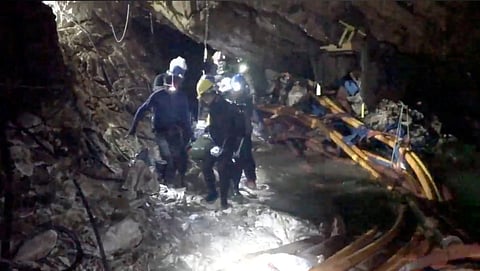Thai cave rescue is the news story the world needs right now
The rescue of 12 boys is a reminder of something we’re in danger of forgetting: our natural default is cooperation

Some days (or some years) it feels like there’s not a lot of good in the world, what with all the trolling and tribalism, divisiveness and anger. In the news, just in the last month, we’ve had fathers killing their children. We read about children being separated from their families at the US border and others becoming seriously ill in the Australian detention camps on Nauru.
In bloodless but no less devastating news, we’re witnessing the old, cohesive post-war international order falling apart; a difficult Brexit, Trump withdrawing from trade agreements and being a destabilising presence at the Nato summit.
The times, they have been toxic.
And then something happens — like the successful rescue of the Wild Boars football team from an underwater cave system in Thailand — and your heart, which was previously calcifying in your chest, lurches back to life.
The rescue effort reminds me of something we’re in danger of forgetting: our natural default is cooperation. Even across cultures. Even across country and language barriers.
And our natural, first instincts are often to help if we can. It’s not just people of means — like Elon Musk with his child-sized submarine (which later turned into a full strop with Musk questioning the expertise of Thai rescue officials). It’s people with all sorts of knowledge. The Guardian has received hundreds of messages (retired British engineers are well-represented) with ideas about how to free the boys and their coach. Some of the rescue plans have been ingenious and left of centre — such as the deployment of the birds’ nest collectors. The men combed the mountain under which the team were trapped, looking for air holes.
“First I heard they needed divers, but then they said they also needed mountain climbers, I thought about my skills using ropes and climbing,” said Nattapong Lekkamnerd, one of eight members of his community who travelled to the cave.
A collection of funds from people in their village for the plane tickets was organised.
People’s better natures shone through: locals said they were OK with having their home flooded if gallons of water needed to be pumped out. Companies such as Thai Airways flew rescuers from the UK into Thailand for free.
Volunteer teams from around the world including China, Myanmar, Australia, the UK and the US descended on the site to assist in the rescue.
And let’s not forget the sacrifice of Saman Kunan, the former Thai navy SEAL who lost his life trying to rescue the football team.
Watching the video of the British and Thai navy Seals who found the boys is a really awesome way to restore your faith in humanity. The divers were experienced rescuers like Rick Stanton, a retired firefighter from Coventry, and John Volanthen, an IT consultant from Bristol.
“You’ve been here for 10 days. You are so strong,” said one of the divers.
“Thank you so much,” says one of the boys, answering in English.
We’re so used to people blaming other people when things go wrong. But in this case, people haven’t blamed the coach. In a letter written inside the cave and delivered to the parents of the Wild Boars, Chantawong, who has coached the team for more than three years, apologised and promised to take care of their children.
The parents wrote back: “Don’t blame yourself ... No parents are angry with you at all, so don’t you worry about that.”
In the cave, Chantawong taught the boys to meditate so they would preserve their energy and not freak out. He also gave them his share of food.
I asked my colleague on the ground, Michael Safi, why this story has captured the world’s attention. “It’s a classic story on some level. Boys become stuck in a well, town rallies to get them out.”
But in a globalised variation on this, it’s now the world that has been rallying to get them out.
It’s not just the dive rescue team — a daisy-chain made up of five Thais and 13 foreigners. It’s people who have arrived from all around the world to report on the story, and to volunteer.
Describing the makeshift tent city, where the volunteers and media where all staying in together, Safi said was “an alternate world ... people from everywhere, all working together. Like Burning Man, but with a sense of purpose that isn’t nihilism and self gratification.”
The Thais, who are used to providing hospitality for people from all over the world, have been excellent hosts. When the word spread that the rescued boys were wanting to eat spicy basil chicken, that is what media were served for dinner that night.
It feels almost weird that this common purpose is being achieved so naturally — nations banding together — sending goodwill and their best people. And you hope, with no strings attached.
Imagine if this was how international relations worked.
Then there was the rest of us at home, in towns and cities across the world, watching the rescue anxiously, willing a successful outcome.
On social media, people in time zones where it was getting close to bedtime, resisted sleep. There was a strong urge to remain vigilant throughout the rescue — as if staying awake you could will it to go well.
Others reported a low-level sort of anxiety leading up to the rescue, thoughts of the boys never far away.
It’s like a real life manifestation of John Lennon’s Imagine — for now. We’ll go back to the horrible news cycle soon enough. But for once, it’s lovely to imagine a brotherhood of man.
— Guardian News & Media Ltd
Brigid Delaney is a Guardian Australia writer and columnist.
Sign up for the Daily Briefing
Get the latest news and updates straight to your inbox



